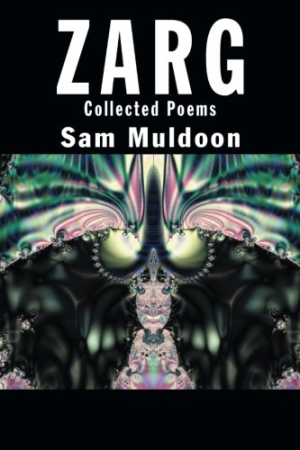Zarg
Collected Poems
A sense of fun and musical exuberance permeates these poems about embracing “the now.”
In Zarg, the collected poems of Sam Muldoon, the poet explores themes of spirituality, mindfulness, antimaterialism, and romantic love in verses that are quirky and philosophical.
The book’s opening line, “Righteousness is a dud blessing,” sharply captures the poems’ sensibilities. This is a collection that opts for irreverent revelry in “the now” over pinning one’s hopes and dreams on future plans.
Poems are often in traditional forms, including sonnets and strictly rhyming quatrains, but Muldoon subverts the forms with his offbeat linguistic choices. His musical proclivities are apparent in poems that revel in hip-hop patois and “Magical Mystery Tour”-era Beatles absurdity. At its best, this oddball mix soars to pleasantly bizarre heights, with phrases like “I be tha man ov da big style” alongside dialectic brain teasers like “I fear nothing / But I am frightened by nothing / Is this possible?”
Yet the poems’ dogged insistence on conforming to rhyme schemes creates some tortured syntax, as with “Santa is the one who does that he brings things.” The collection’s love poems are trite at times.
Other lines radiate nursery-rhyme joy in their celebration of simple pleasures, as with “I’m in sync with my psyche / Give me a race on a bikey.” An ode to an “Imperfect Greenhouse” pines for a messiah: “Nectarine drinks, can appease us / & Make us want a new Jesus.”
Poems also contain occasional non sequiturs that produce a delightfully Dada-esque effect: “We were together… / Now we are lost in the nether / Tortoise.” In “Garden of Eden,” Muldoon creates a graceful image of two lovers merging to become the tree of knowledge, and in “Old Man of the Hill,” he experiments with prose form to craft a fable about a man and his dogs that goes nowhere, narratively speaking, but is filled with delightfully silly rhymes.
With all of these kooky linguistic elements, it’s not always clear if traditional phrasing is being toyed with or if spelling and word usage mistakes are being made, as with “‘Aster la Vistas’” or the statement, “My conscientiousness is now open.”
A few poems have interesting titles, such as “Divine in the Time of Blasphemy” and “Interpretation Xenon,” but many others are a bit bland—named after days of the week, or taken from the first few words of the poem itself. The book is divided into four sections, and it is unclear if there is a thematic or sequential purpose to grouping the poems this way. There is no table of contents to help locate particular verses. Frequently two short poems occupy the same page, an unusual formatting choice for a volume of poetry.
The poems in Zarg exhibit a mature style and advanced understanding of poetic techniques and wordplay, while maintaining a sense of fun and musical exuberance. Muldoon’s themes of embracing the now by abandoning fears and inhibitions is salient and ardently articulated.
Reviewed by
Lisa Butts
Disclosure: This article is not an endorsement, but a review. The publisher of this book provided free copies of the book and paid a small fee to have their book reviewed by a professional reviewer. Foreword Reviews and Clarion Reviews make no guarantee that the publisher will receive a positive review. Foreword Magazine, Inc. is disclosing this in accordance with the Federal Trade Commission’s 16 CFR, Part 255.

